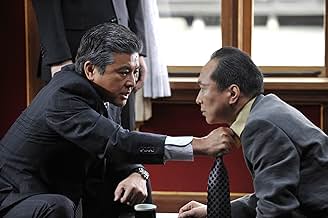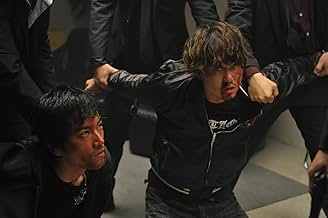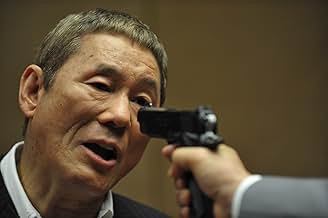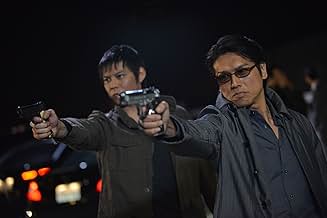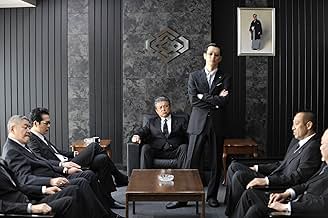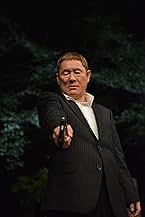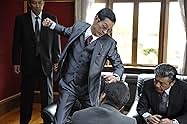VALUTAZIONE IMDb
6,7/10
7598
LA TUA VALUTAZIONE
Mentre la polizia lancia una repressione su vasta scala contro la criminalità organizzata, accende una lotta nazionale della yakuza tra i Sanno dell'Est e Hanabishi dell'Ovest.Mentre la polizia lancia una repressione su vasta scala contro la criminalità organizzata, accende una lotta nazionale della yakuza tra i Sanno dell'Est e Hanabishi dell'Ovest.Mentre la polizia lancia una repressione su vasta scala contro la criminalità organizzata, accende una lotta nazionale della yakuza tra i Sanno dell'Est e Hanabishi dell'Ovest.
- Premi
- 3 vittorie e 7 candidature totali
Takeshi Kitano
- Otomo
- (as Beat Takeshi)
Recensioni in evidenza
"Beyond Outrage" is possible more sober and cynical than the first film, exploring further into the bureaucratic side of the struggle between clans. There seems to be no difference in the ways police, yakuza, and politics work in nowadays Japan: honor is for the weak and any chance is good to betray your partner for a promotion. Character development is again minimal, but at least we have a more charismatic cast this time.
In Takeshi Kitano's Outrage, we sat through some heavy plotting and counter-schemes where every one, a collective of Yakuzas and gangsters, is a bad guy, fighting over power and control when being unwittingly manipulated, together with shifting alliances. The story was pretty brilliant then, since you're really unsure how the concocted plans would turn out, suffice to say it boiled down to very violent affairs, with plenty of firearm action all round.
But Kitano kept his direction well balanced then, as he does so again now, with dramatic scenes happening in the first half of the film, followed by a build up to various violent crescendos in the latter half. We continue where we last left off, where the victors of the first film's schemes, Kato (Tomokazu Miura) and the Otomo Clan turncoat Ishihara (Ryo Kase) return to the top of the food chain, grabbing control over the Sanno-kai crime organization, although not without their detractors from within who will jump at every seductive, suggested opportunity to usurp the throne. It didn't help that their leadership style, parallel to some real world techniques of cost cutting stinginess, doesn't cut it through the rank and file.
And you just can't put a good man down, or a bad man in this case, with Beat Takeshi's Otomo returning to the mayhem as orchestrated by Detective Kataoka (Fumiyo Kohinata). Wait a minute, didn't we witness his key scene in the finale of Outrage? I suppose if one is at the creative helm of the film - directing, writing and editing - then anything's possible. Otomo, as it turns out, is still sitting pretty in prison, but has his enemies quaking in their shoes when rumours got squashed, and Kataoka accelerates Otomo's parole to get him released and back in the fray. With preference for a lowly life amongst the hood, it is genre mantra that one never walks away, but gets pulled back into the hustle and bustle of vengeance and violence.
Between the two films, perhaps I will have to throw my hat of preference over to the first one, if only for a plot that involved a lot more stakeholders, and on screen violence that was more balletic than this follow up's rather tame, and usually off-screen mayhem. Sometimes we get to see flashes from muzzles, compensated by the awesomely rendered loud sounds of multiple rounds leaving the chamber of the gun. And stylistically, which is a fair counter- point to the explicitness of what Hollywood does today, we find ourselves staring down barrels of guns on screen, before cutting to the aftermath.
When put together, while the films touches on tit-for-tat revenge, and perhaps contain a shade of real world organizational politics given the structure of the Yakuza, not only do we get to compare leadership styles and skills of those at the top, but rather how one should be aware of the little man running around, stirring trouble only for personal benefit. Fumiyo Kohinata steals the show each time he comes on screen as the corrupt Detective Kataoka, on the payroll of the force and striving to go up in his career ladder, while on the take from the clans, yet at the same time scheming against all to advance his personal agenda at both sides of the law.
I had nothing but chuckles especially during an interrogation scene which Kataoka engineers, which probably cuts a little close to home given the series of gaffes in high profile court cases that didn't quite put the Home Team in good light. And characters like Kataoka, are not hard to imagine nor stranger than fiction. His opposite would be the ramrod straight Shigeta, who for all his righteousness, couldn't influence the corruption going on in his face, as executed in arrogant style by his counterpart. It's really Kataoka's show from the get go, being the key character, and catalyst in almost all twists and turns, with Fumiyo Kohinata being the quintessential villain amongst all villains here.
But Kitano kept his direction well balanced then, as he does so again now, with dramatic scenes happening in the first half of the film, followed by a build up to various violent crescendos in the latter half. We continue where we last left off, where the victors of the first film's schemes, Kato (Tomokazu Miura) and the Otomo Clan turncoat Ishihara (Ryo Kase) return to the top of the food chain, grabbing control over the Sanno-kai crime organization, although not without their detractors from within who will jump at every seductive, suggested opportunity to usurp the throne. It didn't help that their leadership style, parallel to some real world techniques of cost cutting stinginess, doesn't cut it through the rank and file.
And you just can't put a good man down, or a bad man in this case, with Beat Takeshi's Otomo returning to the mayhem as orchestrated by Detective Kataoka (Fumiyo Kohinata). Wait a minute, didn't we witness his key scene in the finale of Outrage? I suppose if one is at the creative helm of the film - directing, writing and editing - then anything's possible. Otomo, as it turns out, is still sitting pretty in prison, but has his enemies quaking in their shoes when rumours got squashed, and Kataoka accelerates Otomo's parole to get him released and back in the fray. With preference for a lowly life amongst the hood, it is genre mantra that one never walks away, but gets pulled back into the hustle and bustle of vengeance and violence.
Between the two films, perhaps I will have to throw my hat of preference over to the first one, if only for a plot that involved a lot more stakeholders, and on screen violence that was more balletic than this follow up's rather tame, and usually off-screen mayhem. Sometimes we get to see flashes from muzzles, compensated by the awesomely rendered loud sounds of multiple rounds leaving the chamber of the gun. And stylistically, which is a fair counter- point to the explicitness of what Hollywood does today, we find ourselves staring down barrels of guns on screen, before cutting to the aftermath.
When put together, while the films touches on tit-for-tat revenge, and perhaps contain a shade of real world organizational politics given the structure of the Yakuza, not only do we get to compare leadership styles and skills of those at the top, but rather how one should be aware of the little man running around, stirring trouble only for personal benefit. Fumiyo Kohinata steals the show each time he comes on screen as the corrupt Detective Kataoka, on the payroll of the force and striving to go up in his career ladder, while on the take from the clans, yet at the same time scheming against all to advance his personal agenda at both sides of the law.
I had nothing but chuckles especially during an interrogation scene which Kataoka engineers, which probably cuts a little close to home given the series of gaffes in high profile court cases that didn't quite put the Home Team in good light. And characters like Kataoka, are not hard to imagine nor stranger than fiction. His opposite would be the ramrod straight Shigeta, who for all his righteousness, couldn't influence the corruption going on in his face, as executed in arrogant style by his counterpart. It's really Kataoka's show from the get go, being the key character, and catalyst in almost all twists and turns, with Fumiyo Kohinata being the quintessential villain amongst all villains here.
I was waiting for a while to see this film and was totally shocked to find out there was a sequel to it's 2010 predecessor. The 2nd instalment is more composed and deals with the politics and characters on a much deeper level. After watching it I am curious as to if this was one screen play cut into 2 films, or, if Tekeshi and co decided to write another script after the original.
Outrage Beyond is a solid piece of crime cinema. The themes of corruption, loyalty, redemption and honour are explored on multiple levels. I loved the cinematography and was really impressed with the solid performances throughout the film. My pick of a great bunch was Tomokazu Miura's portrayal of the aged and weary "Kato".
The ending solidified this Kitano outing as a classic. Great film.
Outrage Beyond is a solid piece of crime cinema. The themes of corruption, loyalty, redemption and honour are explored on multiple levels. I loved the cinematography and was really impressed with the solid performances throughout the film. My pick of a great bunch was Tomokazu Miura's portrayal of the aged and weary "Kato".
The ending solidified this Kitano outing as a classic. Great film.
Outrage was one of the more conventional Kitano films out there, whereas in previous kitano films the violence was mostly implied, outrage reveled in its graphic tone. However it wasn't all shock value, outrage plot was a political masterpiece, with a yakuza that discarded honor and romantic ideals for cold pragmatism, intelligent, calculating characters looking for their adversaries to take a bait and run with it when up until the end it wasn't clear who was manipulating the events and who would come victorious.
None of the above remains true in the sequel, first of all Beyond Outrage is a tamer film, I'm not sure if it was a stylistic choice, or one that came from budget limitations, but most of the violence is either implied or shown without gore ; that said the film makes up for it with a great use of sound effects, where you will hear and feel every act of violence thanks to it, it is especially true with gun fire which is loud and powerful as it should be.
Now as for the plot, the manipulations and the winner of the struggle are made quite clear from the get-go, this is in part because the script is not as complex as the first one, whereas the original outrage had several layers of deception, here the machinations are simplified and more obvious, characters whose story had run its course in the first one are brought back with a quick dialogue explanation and one relationship in particular is redesigned, but its not very convincing, Even having watched the original, the comeuppance of several characters seems formulaic and not as gratifying as it should have been, lacking the operatic quality previous kitano's entries; the end also comes too soon, leaving the overall endgame hinted at, but not entirely resolved, perhaps in order to make room for a sequel.
So in the end Beyond outrage is a much tamer and straightforward film than its predecessor, it could be viewed as a standalone film since the movie recaps the previous plot in several occasions,the film seems commercially motivated and riding on the success of its predecessor, This now takes the crown as Kitano's most accessible film to date, but that doesn't seem to be an achievement to be proud of.
None of the above remains true in the sequel, first of all Beyond Outrage is a tamer film, I'm not sure if it was a stylistic choice, or one that came from budget limitations, but most of the violence is either implied or shown without gore ; that said the film makes up for it with a great use of sound effects, where you will hear and feel every act of violence thanks to it, it is especially true with gun fire which is loud and powerful as it should be.
Now as for the plot, the manipulations and the winner of the struggle are made quite clear from the get-go, this is in part because the script is not as complex as the first one, whereas the original outrage had several layers of deception, here the machinations are simplified and more obvious, characters whose story had run its course in the first one are brought back with a quick dialogue explanation and one relationship in particular is redesigned, but its not very convincing, Even having watched the original, the comeuppance of several characters seems formulaic and not as gratifying as it should have been, lacking the operatic quality previous kitano's entries; the end also comes too soon, leaving the overall endgame hinted at, but not entirely resolved, perhaps in order to make room for a sequel.
So in the end Beyond outrage is a much tamer and straightforward film than its predecessor, it could be viewed as a standalone film since the movie recaps the previous plot in several occasions,the film seems commercially motivated and riding on the success of its predecessor, This now takes the crown as Kitano's most accessible film to date, but that doesn't seem to be an achievement to be proud of.
I'm refering to the international title of the movie "Beyond Outrage". I do think that the movie is a real good continuation of the first one. Back when I watched it, I didn't know a trilogy would emerge. I don't know what was planned, though I guess certain things might have been set up on purpose. But it's really great how this continues.
Beat Takeshi back again but not really with a vengeance. At least not at first, because he realized he was being used. The first one was quite frantic. I did revisit it, just to remember what had happened. It was a good idea, seeing characters and having them on your radar. A lot of violence and a lot dead people - so not for the faint of hearted ...
Beat Takeshi back again but not really with a vengeance. At least not at first, because he realized he was being used. The first one was quite frantic. I did revisit it, just to remember what had happened. It was a good idea, seeing characters and having them on your radar. A lot of violence and a lot dead people - so not for the faint of hearted ...
Lo sapevi?
- Citazioni
Detective Kataoka: I forgot you were stabbed by that guy Kimura, underboss of that family you crushed.
Otomo: Hey, I never told anybody. Did you arrange that?
Detective Kataoka: I would never.
- ConnessioniFeatured in Zettai ni waratte wa ikenai Nekketsu Kyôshi 24 ji (2012)
I più visti
Accedi per valutare e creare un elenco di titoli salvati per ottenere consigli personalizzati
- How long is Beyond Outrage?Powered by Alexa
Dettagli
- Data di uscita
- Paese di origine
- Sito ufficiale
- Lingue
- Celebre anche come
- Beyond Outrage
- Luoghi delle riprese
- Kobe, Giappone(Port where car is dragged out of the water)
- Aziende produttrici
- Vedi altri crediti dell’azienda su IMDbPro
Botteghino
- Lordo Stati Uniti e Canada
- 3878 USD
- Fine settimana di apertura Stati Uniti e Canada
- 1938 USD
- 5 gen 2014
- Lordo in tutto il mondo
- 17.027.515 USD
- Tempo di esecuzione1 ora 50 minuti
- Colore
- Mix di suoni
- Proporzioni
- 2.35 : 1
Contribuisci a questa pagina
Suggerisci una modifica o aggiungi i contenuti mancanti





